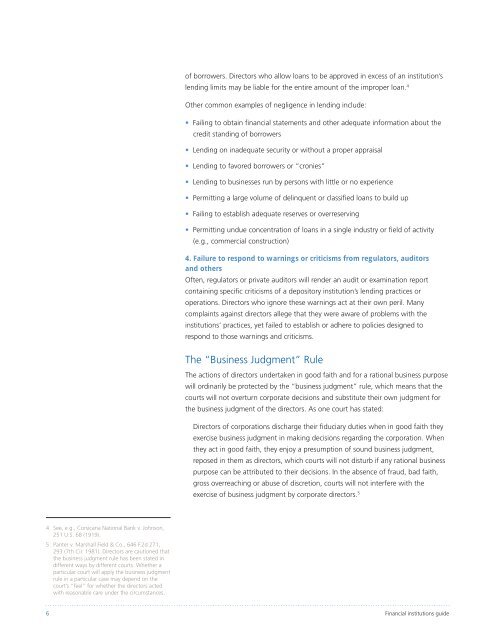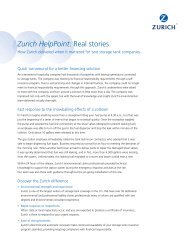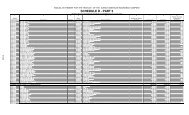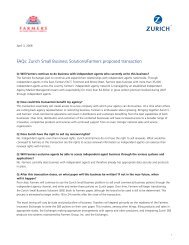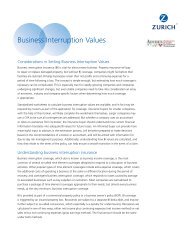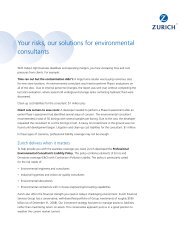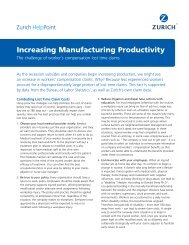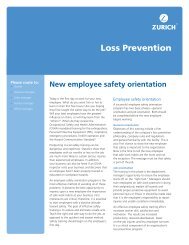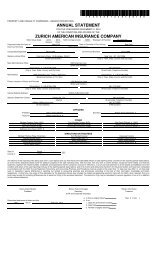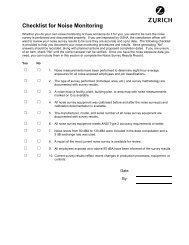Know the risks - Zurich
Know the risks - Zurich
Know the risks - Zurich
Create successful ePaper yourself
Turn your PDF publications into a flip-book with our unique Google optimized e-Paper software.
of borrowers. Directors who allow loans to be approved in excess of an institution’slending limits may be liable for <strong>the</strong> entire amount of <strong>the</strong> improper loan. 4O<strong>the</strong>r common examples of negligence in lending include:• Failing to obtain financial statements and o<strong>the</strong>r adequate information about <strong>the</strong>credit standing of borrowers• Lending on inadequate security or without a proper appraisal• Lending to favored borrowers or “cronies”• Lending to businesses run by persons with little or no experience• Permitting a large volume of delinquent or classified loans to build up• Failing to establish adequate reserves or overreserving• Permitting undue concentration of loans in a single industry or field of activity(e.g., commercial construction)4. Failure to respond to warnings or criticisms from regulators, auditorsand o<strong>the</strong>rsOften, regulators or private auditors will render an audit or examination reportcontaining specific criticisms of a depository institution’s lending practices oroperations. Directors who ignore <strong>the</strong>se warnings act at <strong>the</strong>ir own peril. Manycomplaints against directors allege that <strong>the</strong>y were aware of problems with <strong>the</strong>institutions’ practices, yet failed to establish or adhere to policies designed torespond to those warnings and criticisms.The “Business Judgment” RuleThe actions of directors undertaken in good faith and for a rational business purposewill ordinarily be protected by <strong>the</strong> “business judgment” rule, which means that <strong>the</strong>courts will not overturn corporate decisions and substitute <strong>the</strong>ir own judgment for<strong>the</strong> business judgment of <strong>the</strong> directors. As one court has stated:Directors of corporations discharge <strong>the</strong>ir fiduciary duties when in good faith <strong>the</strong>yexercise business judgment in making decisions regarding <strong>the</strong> corporation. When<strong>the</strong>y act in good faith, <strong>the</strong>y enjoy a presumption of sound business judgment,reposed in <strong>the</strong>m as directors, which courts will not disturb if any rational businesspurpose can be attributed to <strong>the</strong>ir decisions. In <strong>the</strong> absence of fraud, bad faith,gross overreaching or abuse of discretion, courts will not interfere with <strong>the</strong>exercise of business judgment by corporate directors. 54 See, e.g., Corsicana National Bank v. Johnson,251 U.S. 68 (1919).5 Panter v. Marshall Field & Co., 646 F.2d 271,293 (7th Cir. 1981). Directors are cautioned that<strong>the</strong> business judgment rule has been stated indifferent ways by different courts. Whe<strong>the</strong>r aparticular court will apply <strong>the</strong> business judgmentrule in a particular case may depend on <strong>the</strong>court’s “feel” for whe<strong>the</strong>r <strong>the</strong> directors actedwith reasonable care under <strong>the</strong> circumstances.6Financial institutions guide


